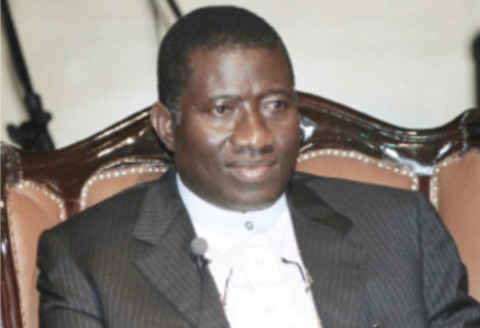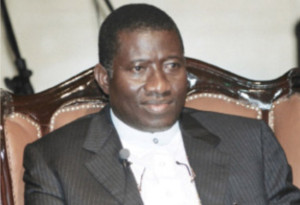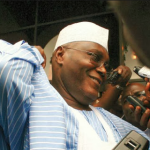The Jonathan challenge on one-term pact
Articles/Opinion Friday, October 4th, 2013
By Sufuyan Ojeifo
On Sunday, September 29, 2013, President Goodluck Jonathan hosted a five-member interview panel in the latest edition of the presidential media chat, which was more refreshing than the previous ones for many reasons that I will not be preoccupied with in this piece.
But I must remark that the president spoke frankly to almost all the issues raised, the most germane being the infamous question of a pact signed by him in the build-up to the Peoples Democratic Party (PDP) presidential primaries, which (pact) purportedly committed him to a single term of office.
The opposition elements in the PDP have been claiming that it was because of Jonathan’s commitment to serve for only a term in office that they supported him for the party’s ticket in 2011. According to them, the president is not entitled to seek re-election in 2015 on the strength of the so-called pact.
Former Permanent Secretary of the FCT Ministry and incumbent governor of Niger State, Muazu Babangida Aliyu, has been the drum major of “the one-term pact” mantra. He had fired the salvo long before the current ballyhoo that has pitched seven aggrieved governors, including Aliyu, against the party leadership and the presidency under the watch of Jonathan.
The way the group had gone about the campaign gave the impression that there was, in fact, a pact inscribed in a document which is in custody somewhere. Many Nigerians probably believed the group when it went to town with the claim, more so as the main dramatis personae-Jonathan- who was said to have entered the pact, did not come out himself, until Sunday, September 29, 2013, to put a lie to the group’s claim.
As I posited in a piece titled: “Jonathan’s re-election bid: let the conversation continue” published in Tribune of Thursday, September, 26, 2013 at page 41 and on the back page of National Mirror of the same day under a slightly modified title, the issue was not and should not be too complicated to deal with.
I recall my position: “The situation, to me, is not complicated at all to deal with, talking about an alleged one-term pact; if there was a pact to which Jonathan appended his signature not to seek re-election, those in whose custody the document is should simply produce it so that the claims and counter claims can be laid to rest once and for all.”
I had further argued that even if the opposition group succeeded in producing a document to that effect, it would not have been able to impose a constitutional burden on the president; that at best it would only impose a moral burden to the extent that trying to seek re-election in spite of the agreement would portray him as an untrustworthy and desperate power seeker.
In the treatise, I had submitted that the constitutionality or otherwise of Jonathan’s re-election bid was an important issue that Anthony Cardinal Olubunmi Okogie tried to gloss over in his extensive interview in The Guardian of Sunday, September 22, 2013 in which he interrogated the president’s speculated second term bid.
And, it bears repeating that nothing else supersedes the provisions of the Nigerian Constitution on the issue of tenure of office for the president; not morality, not sentiments, not even patriotic passion. If some persons feel that they should appeal to the president’s conscience on some selfish terms to make the sacrifice of not exhausting his constitutional rights to contest for a second term in office that will be another thing entirely.
The resort to orchestrated blackmail and/or intimidation, deploying the platform of a phantom pact, which is designed, in the group’s calculations, to intimidate Jonathan from offering himself for re-election, is hopelessly cheap. It is even morally indefensible by members of the group, many of whom had contested and won re-election as governors of their respective states, to push it.
For some reasons known perhaps only to them, they would not want Jonathan to enjoy the luxury of a second term in office as president. They have masterminded a crisis situation in the party and amid the festering crisis, hoisted the flag of a one-term pact, which they had tried to hang on the neck of the president.
But the president’s response to the question on the issue of a pact has sufficiently settled the controversy on the issue. Read him: “I did not sign any agreement with anybody. If I did, they would have shown you the agreement. It was in Addis Ababa, where I said it would be more productive if a president serves for a single term. I did not say Jonathan is not going to contest.”
The point has been well made by the president. In fact, I see his response as a challenge to those propagating the rumour or claim of the existence of a pact, which he signed, not to seek re-election. The opposition group is interestingly talking about “re-election” and that is really what it is-re-election: a second election after the first one in order to continue to enjoy the privileges of office for a constitutionally circumscribed two terms of eight years.
The group is quite conversant with the fact that Jonathan had only contested election once for the position of president in 2011. But for political shenanigans, that find anchorage on enlightened self-interest, members of the opposition group are celebrating falsehood in the garb of a phantom one term pact. This is a sad commentary on the extent public office holders can go to perpetuate mendacity.
Instead of investing energies in constructive engagements that can shore up its secret candidate for the PDP ticket, if it has one that is solid enough to upstage the applecart of Jonathan in case he throws his hat in the ring, the group has been running helter-skelter trying to create a visage of seemingly intractable crisis in the party.
This, perhaps, explains the predilection of the G-7 governors, whose group is led by a former Acting National Chairman of the PDP, Kawu Baraje, to latch on every conceivable reason to frustrate on-going reconciliation initiated by the presidency and the leadership of the mainstream PDP under the chairmanship of Bamanga Tukur.
For instance, the Baraje group had latched on the statement made by Akwa Ibom State governor, Godswill Akpabio, at the end of the September 15, 2013 meeting to the effect that the 2015 ambition of Jonathan was not debatable or negotiable to mean breach of a term of the communiqué which forbade making inflammatory statements prelude to another meeting scheduled for October 7, 2013.
In a manner that underscored the desperation to deepen the crisis created by it, the group headed for a needless visit to the National Assembly to drum support for its demands. The visit had turned awry in the House of Representatives. The group said it breached the term of the communiqué in response to Akpabio’s media briefing moments after the communiqué was read.
But to a very large extent, nothing could be said to be inflammatory about Akpabio’s statement since the issue of Jonathan’s second term was said to be a “no-go” area in the series of meetings both parties had held with each other. It was only after the September 15 meeting that the Baraje group, which obsession has been the ouster of Tukur as national chairman, smuggled Jonathan’s one-term pact into the gallimaufry of their demands.
Now that the president has thrown down the gauntlet to those who claim he signed a pact to show the document to the world, I sincerely hope they accept the challenge and do just that. This is their best opportunity to do so.
The one-term pact document will be magnum opus of the mosaics of claims and rationalizations that have defined the landscape in the unraveling battle for presidential power; and, not the fresh claims by the opposition elements that Jonathan made a promise (not any more a pact signed, sealed and delivered) in 2011 in the US or in Akara, Turkey that he would not contest in 2015. The opposition elements should learn to be consistent in their claims in order to be credible. But unfortunately they cannot give what they do not have. This, no doubt, is their tragedy.
· Mr Ojeifo sent this piece from Abuja.
Related Posts
Short URL: https://www.africanexaminer.com/?p=2207























